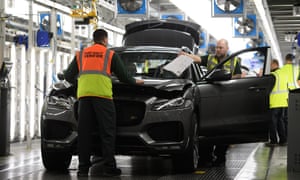Britain’s largest carmaker hit by weak Chinese market and falling diesel sales

Vehicles are checked at the Jaguar Land Rover factory in Solihull.
Photograph: Leon Neal/Getty Images
Jaguar Land Rover suffered the largest loss in its history last year, sinking £3.6bn into the red as it wrestled with a weak Chinese market, falling diesel sales and a one-off downward revision to the value of its business.
Britain’s largest carmaker, owned by India’s Tata Motors, pointed to a return to profitability in the fourth quarter of the year, when it recorded a £120m pretax profit.
But the improvement was overshadowed by the vast loss for the year as a whole, which was mostly because of a writedown it took in the third quarter of the year.
Half of the £3.1bn non-cash charge was taken after JLR accepted that previous investments in property and machinery were worth far less than previously thought.
The other half was attributable to goodwill impairments, an accounting correction that recognises that future earnings potential is likely to be diminished.
Even excluding such one-off non-cash items, the company still suffered a pretax loss of £358m, with revenues down from £25.8bn in 2017 to £24.2bn.
This was largely caused by weakness in the Chinese market, although JLR has also complained of falling diesel sales amid successive pollution scandals, as well as uncertainty related to Brexit.
The company announced plans to cut 4,500 staff earlier this year and said its efficiency plans had already delivered £1.25bn of savings.
The Jaguar Land Rover chief executive, Ralf Speth, said: “Jaguar Land Rover has been one of the first companies in its sector to address the multiple headwinds simultaneously sweeping the automotive industry.
“We are taking concerted action to reduce complexity and to transform our business through cost and cashflow improvements.”
The company did not make any reference to rumours that it had held talks about a takeover by PSA, the French firm that owns Peugeot, Citroen and Vauxhall.